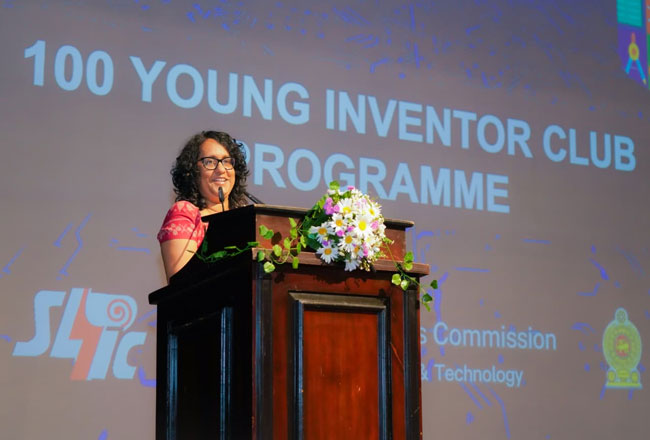September 09, Colombo (LNW): In a call for transformative change within the education sector, Prime Minister Dr Harini Amarasuriya underscored the urgent need to cultivate a generation of thinkers who are not only informed, but also imaginative, inquisitive, and analytically minded.
Speaking at the inauguration of a nationwide initiative aimed at embedding innovation into the school system, the Prime Minister emphasised that Sri Lanka’s future prosperity will depend on the creativity and critical faculties of its youth.
The event, held on Monday at the Faculty of Medicine, University of Colombo, marked the formal launch of a national programme to establish 100 ‘Young Inventor Clubs’ across schools island-wide. Organised by the Ministry of Science and Technology, the initiative was launched under the joint patronage of the Prime Minister and the Minister of Science and Technology, Professor Chrishantha Abeysena.
In a symbolic gesture to initiate the programme, nine schools—each representing one of Sri Lanka’s provinces—were presented with ‘Innovation Tokens’ by the Prime Minister, formally setting the stage for the formation of inventor clubs in the school network.
The gathering brought together educators, policymakers, scientists, and students for a wide-ranging discussion on how innovation can serve as a cornerstone for national development. Topics explored included the economic potential of fostering innovation from a young age, the structural reforms needed in education, the intellectual property rights associated with student inventions, and the broader role of innovation in cultivating a future-ready workforce.
In her keynote address, Dr Amarasuriya challenged conventional notions of academic success, asserting that innovation should not be measured by degrees, grades, or patent counts, but rather by the tangible impact one makes in improving society. She advocated for an education model that transcends rote learning and embraces independent thought, curiosity, and problem-solving.
“What the world needs today are not passive consumers of information, but young minds who can question what they are told, reinterpret existing data, and use it in ways that can transform lives,” she said. “It’s not about how much you know—it’s about how you think.”
She went on to stress that fostering a culture of socially conscious innovation is a responsibility that rests not just with educators and institutions, but also with the government. The state, she said, must create the right conditions—both material and cultural—for young inventors to thrive. This includes nurturing values of empathy, responsibility, and ethical engagement alongside technical skills.
Professor Chrishantha Abeysena, speaking at the same event, echoed the Prime Minister’s sentiments. He highlighted the critical importance of positioning innovation as a national priority, emphasising that both the Ministry of Science and Technology and the Ministry of Education bear responsibility for nurturing the country’s most vital asset: its young people.
He noted that Sri Lanka’s future will be shaped not only by its natural resources or infrastructure, but by the ideas and ingenuity of the next generation. The government, he affirmed, is committed to supporting young innovators and providing them with the platforms and opportunities they need to pursue their ambitions.
The newly launched inventor clubs are expected to serve as incubators for youthful creativity, where students can collaborate on projects, explore new technologies, and gain hands-on experience in fields ranging from engineering to environmental science.
